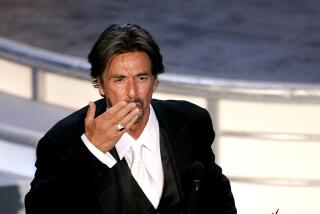James Gandolfini dies at 51; villain, hero, sex symbol and slob
James Gandolfini, the most important actor in the most influential television series of the last decade and a half, died suddenly Wednesday, in Italy. He was only 51, and though he had been a busy working actor -- in film and onstage as well as on TV -- for two decades, and had (with writer David Chase) created a character for the ages, he was also at what, especially in light of an early death, felt like the beginning of his career.
Even though he spent the years of “The Sopranos” and afterward taking parts that told the world there was more to him than a New Jersey mob boss -- that is to say, waste management consultant -- its length and depth, its cultural mass, guarantee that Tony Soprano is the role for which he’ll be most remembered. Tony was more than a character, of course; he was the fulcrum of a shared experience, the instrument of a new age of television. “Breaking Bad” and Walter White owe him everything.
If it is impossible to imagine “The Sopranos” without Tony -- indeed, the show ended with what is generally, if not unanimously, taken to represent the snuffing out of his consciousness -- it is also impossible to imagine Tony without Gandolfini.
PHOTOS: James Gandolfini | 1961-2013
The casting was bold and almost subversively counterintuitive. In the normal way of Hollywood, where physiognomy is destiny, Gandolfini might have spent his life in the sort of supporting roles that had earlier defined his career, limited by his ethnicity, his bulk, his encroaching baldness. Among its other gifts to television, “The Sopranos” demonstrated that star quality does not depend upon Hollywood’s narrow conception of good looks. (Even in gangster films, the leads have traditionally been conventionally handsome. In “The Sopranos,” by contrast, the too-handsome character was always somehow to be regarded with suspicion.)
Gandolfini was only 37 -- or, in acting-life terms, already 37 -- when “The Sopranos” premiered in January 1999. (Its six seasons took until 2007 to complete.) He had played thugs and gangsters before, across the 1990s, in films including “True Romance,” “Terminal Velocity,” “The Juror” and “Get Shorty.” But this was something different: a bad man in a psychological crisis triggered by a family of ducks leaving his backyard pool -- a character that could easily have become a joke (not that there wasn’t comedy to be played) in the hands of a lesser actor.
Tony was, as the situation demanded, a villain, a hero, a sex symbol and a slob. He was a put-upon son, a concerned if misguided father, a philandering though not exactly disloyal husband, a frequently exasperated boss, a person of more than average intelligence but limited vision, a thug not without sensitivity or a sense of humor and, in ways that mattered to the audience, at least, better than the men who surrounded him.
PHOTOS: Gandolfini’s career highlights
It was always a little bit of a shock, in the “Sopranos” years, to see the actor as himself, to find him relieved of Tony’s spiritual heaviness, the Dorian Gray crust of sins he wore just beneath the skin when he played the character. With Tony Soprano, he emphasized mass and force, but like many big men -- like, Oliver Hardy, say, whom he could have played with aplomb -- Gandolfini was light on his feet, graceful and elegant in spite of his size. It’s instructive to watch him in the first episodes of “The Sopranos’” sixth season, when, in a coma, he dreamed himself an “ordinary person,” or as the sensitive gay hit man he plays in “The Mexican,” or lip-syncing Engelbert Humperdinck in John Turturro’s “Romance & Cigarettes,” or as the fond, if demanding father in “Not Fade Away,” the film that reunited him with David Chase.
There was a softness, and a sweetness to Gandolfini -- qualities that, indeed, may have been what kept Tony Soprano bearable company through the years. Because even taking the part of a most violent man, he could not hide, or chose not to, what was clear for us to see: that he was an artist.
MORE ON HIS LIFE AND DEATH:
VIDEO: Tony Soprano’s best scenes
PHOTOS: Celebrities react on Twitter
OBITUARY: James Gandolfini swaggered his way to fame
REACTION: Stars heartbroken by news of Gandolfini’s death
More to Read
The complete guide to home viewing
Get Screen Gab for everything about the TV shows and streaming movies everyone’s talking about.
You may occasionally receive promotional content from the Los Angeles Times.







